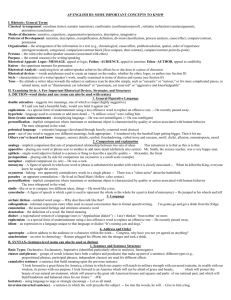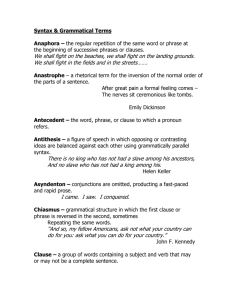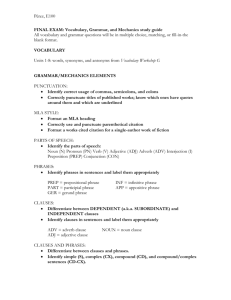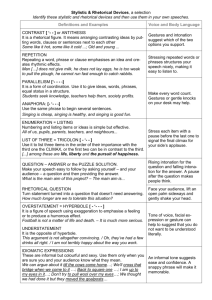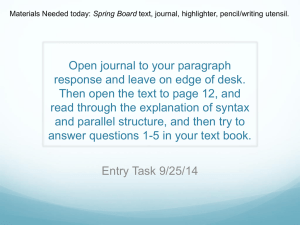Concepts in Rhetoric (blue sheet)
advertisement
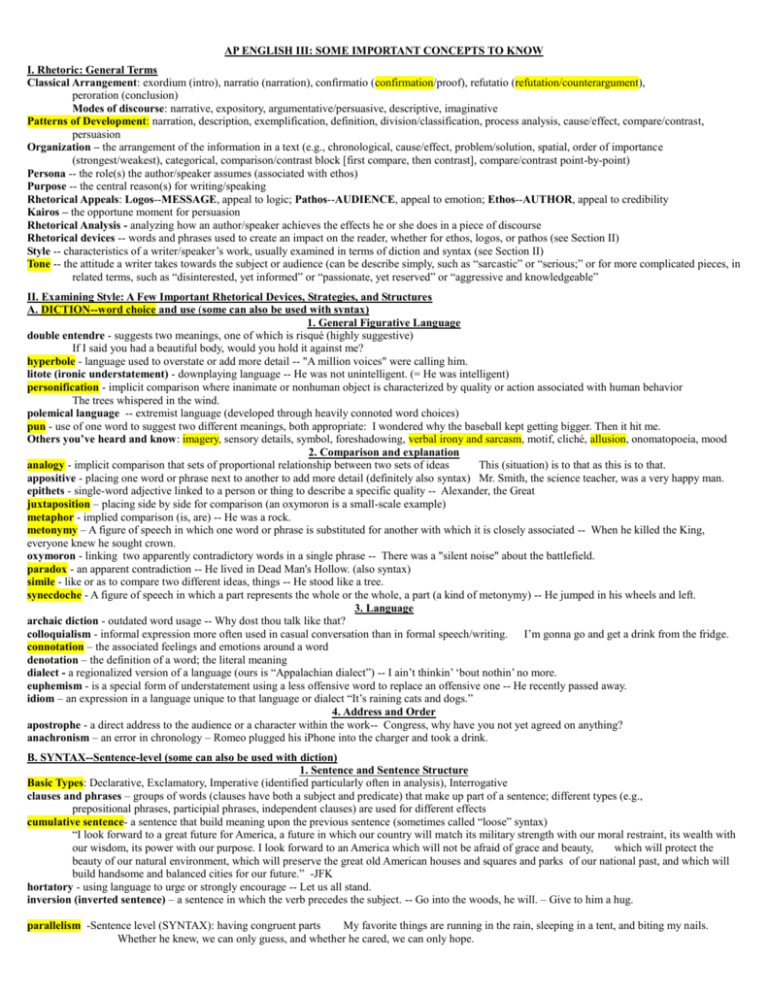
AP ENGLISH III: SOME IMPORTANT CONCEPTS TO KNOW I. Rhetoric: General Terms Classical Arrangement: exordium (intro), narratio (narration), confirmatio (confirmation/proof), refutatio (refutation/counterargument), peroration (conclusion) Modes of discourse: narrative, expository, argumentative/persuasive, descriptive, imaginative Patterns of Development: narration, description, exemplification, definition, division/classification, process analysis, cause/effect, compare/contrast, persuasion Organization – the arrangement of the information in a text (e.g., chronological, cause/effect, problem/solution, spatial, order of importance (strongest/weakest), categorical, comparison/contrast block [first compare, then contrast], compare/contrast point-by-point) Persona -- the role(s) the author/speaker assumes (associated with ethos) Purpose -- the central reason(s) for writing/speaking Rhetorical Appeals: Logos--MESSAGE, appeal to logic; Pathos--AUDIENCE, appeal to emotion; Ethos--AUTHOR, appeal to credibility Kairos – the opportune moment for persuasion Rhetorical Analysis - analyzing how an author/speaker achieves the effects he or she does in a piece of discourse Rhetorical devices -- words and phrases used to create an impact on the reader, whether for ethos, logos, or pathos (see Section II) Style -- characteristics of a writer/speaker’s work, usually examined in terms of diction and syntax (see Section II) Tone -- the attitude a writer takes towards the subject or audience (can be describe simply, such as “sarcastic” or “serious;” or for more complicated pieces, in related terms, such as “disinterested, yet informed” or “passionate, yet reserved” or “aggressive and knowledgeable” II. Examining Style: A Few Important Rhetorical Devices, Strategies, and Structures A. DICTION--word choice and use (some can also be used with syntax) 1. General Figurative Language double entendre - suggests two meanings, one of which is risqué (highly suggestive) If I said you had a beautiful body, would you hold it against me? hyperbole - language used to overstate or add more detail -- "A million voices" were calling him. litote (ironic understatement) - downplaying language -- He was not unintelligent. (= He was intelligent) personification - implicit comparison where inanimate or nonhuman object is characterized by quality or action associated with human behavior The trees whispered in the wind. polemical language -- extremist language (developed through heavily connoted word choices) pun - use of one word to suggest two different meanings, both appropriate: I wondered why the baseball kept getting bigger. Then it hit me. Others you’ve heard and know: imagery, sensory details, symbol, foreshadowing, verbal irony and sarcasm, motif, cliché, allusion, onomatopoeia, mood 2. Comparison and explanation analogy - implicit comparison that sets of proportional relationship between two sets of ideas This (situation) is to that as this is to that. appositive - placing one word or phrase next to another to add more detail (definitely also syntax) Mr. Smith, the science teacher, was a very happy man. epithets - single-word adjective linked to a person or thing to describe a specific quality -- Alexander, the Great juxtaposition – placing side by side for comparison (an oxymoron is a small-scale example) metaphor - implied comparison (is, are) -- He was a rock. metonymy – A figure of speech in which one word or phrase is substituted for another with which it is closely associated -- When he killed the King, everyone knew he sought crown. oxymoron - linking two apparently contradictory words in a single phrase -- There was a "silent noise" about the battlefield. paradox - an apparent contradiction -- He lived in Dead Man's Hollow. (also syntax) simile - like or as to compare two different ideas, things -- He stood like a tree. synecdoche - A figure of speech in which a part represents the whole or the whole, a part (a kind of metonymy) -- He jumped in his wheels and left. 3. Language archaic diction - outdated word usage -- Why dost thou talk like that? colloquialism - informal expression more often used in casual conversation than in formal speech/writing. I’m gonna go and get a drink from the fridge. connotation – the associated feelings and emotions around a word denotation – the definition of a word; the literal meaning dialect - a regionalized version of a language (ours is “Appalachian dialect”) -- I ain’t thinkin’ ‘bout nothin’ no more. euphemism - is a special form of understatement using a less offensive word to replace an offensive one -- He recently passed away. idiom – an expression in a language unique to that language or dialect “It’s raining cats and dogs.” 4. Address and Order apostrophe - a direct address to the audience or a character within the work-- Congress, why have you not yet agreed on anything? anachronism – an error in chronology – Romeo plugged his iPhone into the charger and took a drink. B. SYNTAX--Sentence-level (some can also be used with diction) 1. Sentence and Sentence Structure Basic Types: Declarative, Exclamatory, Imperative (identified particularly often in analysis), Interrogative clauses and phrases – groups of words (clauses have both a subject and predicate) that make up part of a sentence; different types (e.g., prepositional phrases, participial phrases, independent clauses) are used for different effects cumulative sentence- a sentence that build meaning upon the previous sentence (sometimes called “loose” syntax) “I look forward to a great future for America, a future in which our country will match its military strength with our moral restraint, its wealth with our wisdom, its power with our purpose. I look forward to an America which will not be afraid of grace and beauty, which will protect the beauty of our natural environment, which will preserve the great old American houses and squares and parks of our national past, and which will build handsome and balanced cities for our future.” -JFK hortatory - using language to urge or strongly encourage -- Let us all stand. inversion (inverted sentence) – a sentence in which the verb precedes the subject. -- Go into the woods, he will. – Give to him a hug. parallelism -Sentence level (SYNTAX): having congruent parts My favorite things are running in the rain, sleeping in a tent, and biting my nails. Whether he knew, we can only guess, and whether he cared, we can only hope. periodic sentence- a sentence where the main clause isn’t expressed until the end (sometimes called “suspended” syntax). The clause is delayed for emphasis, usually by parallel structures and repetitious phrases/clauses). “If, instead of listening to the war-mongers of the military-industrial establishment, the politicians had only listened to what people had been writing in their letters and in the newspaper columns, if they had only listened to what the demonstrators had been shouting in the streets and on the campuses, if they had only listened to what was in their hearts, the war would have ended long ago.” -JFK rhetorical question--a question asked for effect rather than to elicit an answer rhetorical fragment--a purposeful sentence fragment used to emphasize a word, phrase, or clause sentence length: long, short, choppy, fragment sentence variety -- offering a mix of basic structure types (simple, compound, complex, compound/complex), purposes (declarative, exclamatory, interrogative, imperative) lengths (short, long), and advanced structures (period, cumulative, inverted, rhetorical fragment, rhetorical question) zeugma - A general term describing when one part of speech (most often the main verb, but sometimes a noun) governs two or more other parts of a sentence (often in a series)—"He carried a strobe light and the responsibility for the lives of his men." (Tim O'Brien, The Things They Carried) 2. Interruption and Omission anacoluthon - when a sentence abruptly changes from one syntactic structure to another -Agreements entered into when one state of facts exists -- are they to be maintained regardless of changing conditions? The man who was in the barn—he was the man who was putting up hay. All of the things we want—do we really want them? aposiopesis – a device that simulates the impression of a speaker so overwhelmed by emotions that he or she is unable to continue speaking Why I oughta-ellipsis - the omission of words or phrases that are implied by context The woman worked, she slept, she worked. / I am a fraidy-cat; my wife, a daredevil. exclamation - a type of interruption in which the speaker or writer stops a sentence midway and addresses an individual -This is not what I had in—Charles, stop that! parenthesis - an interruption of a sentence before completion to insert some word, phrase, or clause that launches a new idea He told his wife—and his family whom he loved more than anything—that he was leaving. 3. Repetition, Rhythm, and Pacing anadiplosis – repetition of the last word of a line/clause/sentence at the beginning of the next. They said it was a mistake. Mistakes are funny things, though. anaphora - the repetition of a word or phrase at the beginning of successive lines, phrases, clauses, verses, or sentences. Never again will I make that mistake. Never again will I drink old milk. Never again will dairy make me throw up. Never again. antimetabole - a figure of speech in which a pair of words is repeated in reverse order “All for one, and one for all.” antithesis - grammatical forms or parts of speech that are repeated in the sentence and are used to express opposing or contrary meaning He was worried about his reputation, not his income. asyndeton – purposeful omission of conjunctions for rhetorical effect "Give me your tired, your poor, [and] your huddled masses yearning to breathe free…” epistrophe - the repetition of a word or phrase at the end of successive lines, phrases, clauses, verses, or sentences. (opposite of anaphora) “We are born to sorrow, pass our time in sorrow, end our days in sorrow.” “What lies behind us and what lies before us are tiny compared to what lies within us." —Emerson mesodiplosis - "We are troubled on every side, yet not distressed; we are perplexed, but not in despair; persecuted, but not forsaken; cast down, but not destroyed..." -Second Epistle to the Corinthians pacing -- (sentence level) a general term for the rhythm and speed of a piece, controlled by sentence length and type (see “sentence variety”) polyptoton – a type of pun using repetition of different versions of a word with the same root. --"With eager feeding food doth choke the feeder." Shakespeare polysyndeton – The repetition of conjunctions in close succession, especially where not needed, for rhetorical effect -- He wanders here and there and everywhere. III. Other rhetorical strategies and issues 1. Broad Elements call to action – a request or petition by the writer to move the reader to take action on an issue qualifier -- a word or phrase that limits a claim, such as usually, sometimes, in many cases unspoken assumption – the writer’s belief about the attitudes, values, or knowledge possessed by the readers, audience, or subject matter transitions – a word or phrase designed to emphasize connections between ideas and to move the argument from on section to the next 2. Sneaky Argumentative Techniques obfuscation – the concealment of intended meaning, making communication confusing, intentionally ambiguous, and difficult to interpret. paralipsis - a kind of irony in which the speaker proposes not to speak of a matter, but still somehow reveals it circumlocution – talking around a subject rather than addressing it directly; using many words when fewer would do in an attempt to be vague or evasive raising extremes – using another’s extreme argument to make one’s own look less extreme 3. Logical Fallacies (just a few) Straw man – arguing with an over-simplified version of an opposing argument Non sequitur – making a conclusion that doesn’t follow from the reasons False dilemma/false dichotomy – acting as if the decision is either______or _______ when there could be other options Ad hominem – attacking an opponent’s character rather than his or her argument Slippery slopes – assuming a chain of events will occur (If we allow this to happen…) Red herrings – changing the argument by discussing something related but not the central issue Hasty generalizations – drawing conclusions too quickly without considering all sides of the issue Post hoc – assuming a relationship (especially cause and effect) when there aren’t grounds for such an assumption Begging the question – talking around the question (sometimes called circumlocution; often, obfuscation is lumped into this category) IV. Literary and Other Writing Conventions Theme, point of view, plot, setting, mood, major points, citation
